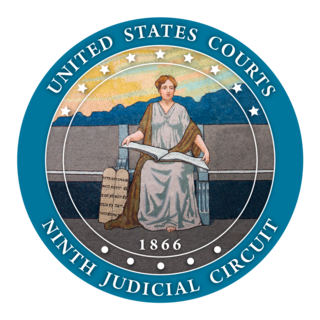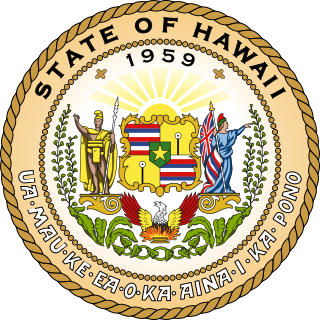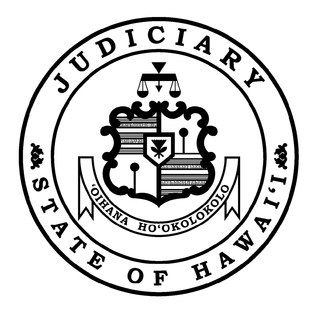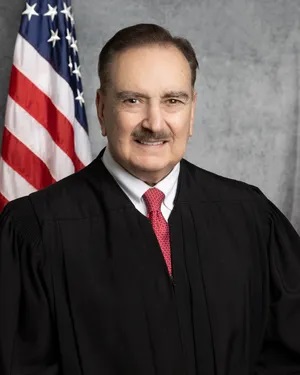In the United States, a state supreme court is the highest court in the state judiciary of a U.S. state. On matters of state law, the judgment of a state supreme court is considered final and binding in both state and federal courts.

The United States district courts are the trial courts of the U.S. federal judiciary. There is one district court for each federal judicial district. Each district covers one U.S. state or a portion of a state. There is at least one federal courthouse in each district, and many districts have more than one. District court decisions are appealed to the U.S. court of appeals for the circuit in which they reside, except for certain specialized cases that are appealed to the U.S. Court of Appeals for the Federal Circuit or directly to the U.S. Supreme Court.
In common law systems, a superior court is a court of general jurisdiction over civil and criminal legal cases. A superior court is "superior" in relation to a court with limited jurisdiction, which is restricted to civil cases involving monetary amounts with a specific limit, or criminal cases involving offenses of a less serious nature. A superior court may hear appeals from lower courts. For courts of general jurisdiction in civil law system, see ordinary court.

The United States Court of Appeals for the Ninth Circuit is the U.S. federal court of appeals that has appellate jurisdiction over the U.S. district courts for the following federal judicial districts:
Probation in criminal law is a period of supervision over an offender, ordered by the court often in lieu of incarceration. In some jurisdictions, the term probation applies only to community sentences, such as suspended sentences. In others, probation also includes supervision of those conditionally released from prison on parole. An offender on probation is ordered to follow certain conditions set forth by the court, often under the supervision of a probation officer. During the period of probation, an offender faces the threat of being incarcerated if found breaking the rules set by the court or probation officer.

The Hawaiʻi State Judiciary is the official name of the judicial system of Hawaiʻi in the United States. Based in Honolulu, the Hawaiʻi State Judiciary is a unified state court system that functions under the Chief Justice of the Hawaiʻi State Supreme Court who is its administrator-in-chief.

The Hawaii State Intermediate Court of Appeals (ICA) is the intermediate appellate court of the Hawaii State Judiciary. It has jurisdiction over appeals from lower courts and agencies.
The Hawaii State Tax Appeal Court of the Hawaii State Judiciary has jurisdiction over cases involving property, excise, liquor, tobacco, income and insurance taxes.

The Hawaii state circuit courts are the trial courts of general jurisdiction in Hawaii. They are the primary civil and criminal courts of the Hawaii State Judiciary. The circuit courts are the only Hawaii state courts to conduct jury trials..

District courts are a category of courts which exists in several nations, some call them "small case court" usually as the lowest level of the hierarchy.
The judiciary of Australia comprises judges who sit in federal courts and courts of the States and Territories of Australia. The High Court of Australia sits at the apex of the Australian court hierarchy as the ultimate court of appeal on matters of both federal and State law.

The United States District Court for the District of Hawaii is the principal trial court of the United States Federal Court System in the state of Hawaii. The court's territorial jurisdiction encompasses the state of Hawaii and the territories of Midway Atoll, Wake Island, Johnston Atoll, Kingman Reef, Palmyra Atoll, Baker Island, Howland Island, and Jarvis Island; it also occasionally handles federal issues that arise in the territory of American Samoa, which has no local federal court or territorial court. It is located at the Prince Kuhio Federal Building in downtown Honolulu, fronting the Aloha Tower and Honolulu Harbor. The court hears both civil and criminal cases as a court of law and equity. A branch of the district court is the United States Bankruptcy Court which also has chambers in the federal building. The United States Court of Appeals for the Ninth Circuit has appellate jurisdiction over cases coming out of the District of Hawaii. The United States Attorney for the District of Hawaii represents the United States in all civil and criminal cases within her district.

Same-sex marriage has been legal in Hawaii since December 2, 2013. The Hawaii State Legislature held a special session beginning on October 28, 2013, and passed the Hawaii Marriage Equality Act legalizing same-sex marriage. Governor Neil Abercrombie signed the legislation on November 13, and same-sex couples began marrying on December 2, making Hawaii the fifteenth U.S. state to legalize same-sex marriage. Hawaii also allows both same-sex and opposite-sex couples to formalize their relationships legally in the form of civil unions and reciprocal beneficiary relationships. Civil unions provide the same rights, benefits, and obligations of marriage at the state level, while reciprocal beneficiary relationships provide a more limited set of rights. When Hawaii's civil union law took effect at the start of 2012, same-sex marriages established in other jurisdictions were considered civil unions in Hawaii.
Harold Michael Fong was an American lawyer and a United States district judge of the United States District Court for the District of Hawaii.

David Alan Ezra is a senior United States district judge of the United States District Court for the District of Hawaii. Since January 2013, Ezra has been designated by the Chief Justice of the United States Supreme Court to serve on the United States District Court for the Western District of Texas, San Antonio and Austin Divisions to help ease the heavy workload for the federal judges in Texas. Judge Ezra is often designated to sit on the United States Court of Appeals for the Ninth Circuit where he holds the record for the most designated sittings of any judge in that Court’s history.

Helen Patricia Willey Gillmor is a senior United States district judge of the United States District Court for the District of Hawaii.

Baehr v. Miike was a lawsuit in which three same-sex couples argued that Hawaii's prohibition of same-sex marriage violated the state constitution. Initiated in 1990, as the case moved through the state courts, the passage of an amendment to the state constitution in 1998 led to the dismissal of the case in 1999. The Full Faith and Credit Clause of the Constitution would have provided that all states would be potentially required to recognize marriages obtained in Hawaii, prompting the passage of the federal Defense of Marriage Act (DOMA) in 1996 under Bill Clinton. Dozens of statutes and constitutional amendments banning same-sex unions at the state level also followed Baehr.

Derrick Kahala Watson is an American lawyer who serves as the chief United States district judge of the United States District Court for the District of Hawaii.

Executive Order 13780, titled Protecting the Nation from Foreign Terrorist Entry into the United States, was an executive order signed by United States President Donald Trump on March 6, 2017. It placed a 90-day restriction on entry to the U.S. by nationals of Iran, Libya, Somalia, Sudan, Syria and Yemen, and barred entry for all refugees who did not possess either a visa or valid travel documents for 120 days. This executive order—sometimes called "Travel Ban 2.0"—revoked and replaced Executive Order 13769 issued on January 27, 2017.
Trump v. Hawaii, No. 17-965, 585 U.S. ___ (2018), was a landmark United States Supreme Court case involving Presidential Proclamation 9645 signed by President Donald Trump, which restricted travel into the United States by people from several nations, or by refugees without valid travel documents. Hawaii and several other states and groups challenged the Proclamation and two predecessor executive orders also issued by Trump on statutory and constitutional grounds. Citing a variety of statements by Trump and administration officials, they argued that the proclamation and its predecessor orders were motivated by anti-Muslim animus.











